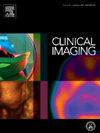基于深度学习的医学图像中结直肠癌检测:数据集、方法和未来方向的综合分析
IF 1.5
4区 医学
Q3 RADIOLOGY, NUCLEAR MEDICINE & MEDICAL IMAGING
引用次数: 0
摘要
本文全面回顾了2019 - 2025年人工智能在医学影像检测大肠癌中的应用现状和演变。该研究对用于训练和验证的110篇高质量出版物和9个可公开访问的医学图像数据集进行了定量分析。各种卷积神经网络架构-包括ResNet(40个实现),VGG(18个实现)和新兴的基于变压器的模型(12个实现)-用于分类,对象检测和分割任务进行了系统的分类和评估。研究包括用于提高模型性能的超参数优化技术,特别关注遗传算法和粒子群优化方法。通过可视化技术,如Grad-CAM和SHAP,分析了可解释的AI方法在医学诊断解释中的作用。通过趋势分析确定了技术限制,包括数据集稀缺性、计算约束和标准化挑战。通过对不同架构实现的性能指标进行比较评估,突出了当前方法中的研究差距。基于发表趋势分析,提出了未来可能的研究方向,包括多模态学习和联邦学习方法。本文综述可为医学图像分析研究人员和临床从业者实施基于人工智能的结直肠癌检测系统提供综合参考。本文章由计算机程序翻译,如有差异,请以英文原文为准。
Deep learning based colorectal cancer detection in medical images: A comprehensive analysis of datasets, methods, and future directions
This comprehensive review examines the current state and evolution of artificial intelligence applications in colorectal cancer detection through medical imaging from 2019 to 2025. The study presents a quantitative analysis of 110 high-quality publications and 9 publicly accessible medical image datasets used for training and validation. Various convolutional neural network architectures—including ResNet (40 implementations), VGG (18 implementations), and emerging transformer-based models (12 implementations)—for classification, object detection, and segmentation tasks are systematically categorized and evaluated. The investigation encompasses hyperparameter optimization techniques utilized to enhance model performance, with particular focus on genetic algorithms and particle swarm optimization approaches. The role of explainable AI methods in medical diagnosis interpretation is analyzed through visualization techniques such as Grad-CAM and SHAP. Technical limitations, including dataset scarcity, computational constraints, and standardization challenges, are identified through trend analysis. Research gaps in current methodologies are highlighted through comparative assessment of performance metrics across different architectural implementations. Potential future research directions, including multimodal learning and federated learning approaches, are proposed based on publication trend analysis. This review serves as a comprehensive reference for researchers in medical image analysis and clinical practitioners implementing AI-based colorectal cancer detection systems.
求助全文
通过发布文献求助,成功后即可免费获取论文全文。
去求助
来源期刊

Clinical Imaging
医学-核医学
CiteScore
4.60
自引率
0.00%
发文量
265
审稿时长
35 days
期刊介绍:
The mission of Clinical Imaging is to publish, in a timely manner, the very best radiology research from the United States and around the world with special attention to the impact of medical imaging on patient care. The journal''s publications cover all imaging modalities, radiology issues related to patients, policy and practice improvements, and clinically-oriented imaging physics and informatics. The journal is a valuable resource for practicing radiologists, radiologists-in-training and other clinicians with an interest in imaging. Papers are carefully peer-reviewed and selected by our experienced subject editors who are leading experts spanning the range of imaging sub-specialties, which include:
-Body Imaging-
Breast Imaging-
Cardiothoracic Imaging-
Imaging Physics and Informatics-
Molecular Imaging and Nuclear Medicine-
Musculoskeletal and Emergency Imaging-
Neuroradiology-
Practice, Policy & Education-
Pediatric Imaging-
Vascular and Interventional Radiology
 求助内容:
求助内容: 应助结果提醒方式:
应助结果提醒方式:


